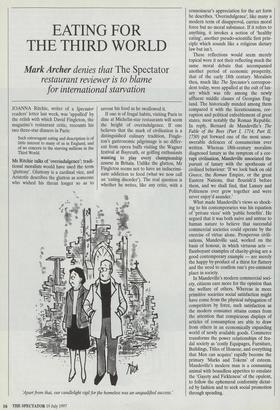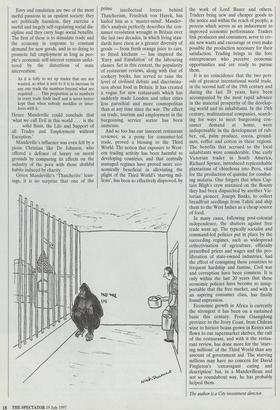EATING FOR THE THIRD WORLD
Mark Archer denies that The Spectator
restaurant reviewer is to blame for international starvation
JOANNA Ritchie, writer of a Spectator readers' letter last week, was 'appalled' by the relish with which David Fingleton, the magazine's restaurant critic, recounts his two three-star dinners in Paris: Such extravagant eating and description is of little interest to many of us in England, and of no concern to the starving millions in the Third World.
Ms Ritchie talks of `overindulgence'; tradi- tional moralists would have used the term `gluttony'. Gluttony is a cardinal vice, and Aristotle describes the glutton as someone who wished his throat longer so as to savour his food as he swallowed it.
If one is of frugal habits, visiting Paris to dine at Michelin-star restaurants will seem the height of overindulgence. If one believes that the mark of civilisation is a distinguished culinary tradition, Fingle- ton's gastronomic pilgrimage is no differ- ent from opera buffs visiting the Wagner festival at Bayreuth, or golfing enthusiasts wanting to play every championship course in Britain. Unlike the glutton, Mr Fingleton seems not to have an indiscrimi- nate addiction to food (what we now call an 'eating disorder'). The real question is whether he writes, like any critic, with a Apart from that, our candlelight vigil for (he homeless was an unqualified success.' connoisseur's appreciation for the art form he describes. 'Overindulgence', like many a modern term of disapproval, carries moral force but no moral substance. If it refers to anything, it invokes a notion of 'healthy eating', another pseudo-scientific first prin- ciple which sounds like a religious dietary law but isn't.
These reflections would seem merely topical were it not their reflecting much the same moral debate that accompanied another period of economic prosperity, that of the early 18th century. Moralists then, much like The Spectator's correspon- dent today, were appalled at the cult of lux- ury which was rife among the newly affluent middle classes of Georgian Eng- land. The historically minded among them compared it with the licentiousness, cor- ruption and political enfeeblement of great states, most notably the Roman Republic. In reply, Bernard de Mandeville's The Fable of the Bees (Part I, 1714; Part II, 1730) put forward one of the most unan- swerable defences of consumerism ever written. Whereas 18th-century moralists diagnosed luxury as the symptom of a cor- rupt civilisation, Mandeville associated the pursuit of luxury with the apotheosis of civilised behaviour: 'If we look back on old Greece, the Roman Empire, or the great Eastern Nations, that flourish'd before them, and we shall find, that Luxury and Politeness ever grew together and were never enjoy'd asunder.'
What made Mandeville's views so shock- ing to his contemporaries was his equation of 'private vices' with 'public benefits'. He argued that it was both naive and untrue to human nature to believe that successful commercial societies could operate by the exercise of virtue alone. Prosperous civili- sations, Mandeville said, worked on the basis of honour, in which virtuous acts flamboyant examples of charity-giving are a good contemporary example — are merely the happy by-product of a thirst for flattery and the need to confirm one's pre-eminent place in society.
In Mandeville's modern commercial soci- ety, citizens care more for the opinion than the welfare of others. Whereas in more primitive societies social satisfaction might have come from the physical subjugation of competitors by force, such satisfaction as the modern consumer attains comes from the attention that conspicuous displays of articles of consumption are able to draw from others in an economically expanding world of newly available goods. Commerce transforms the power relationships of feu- dal society as 'costly Equipages, Furniture, Buildings, Titles of Honour, and everything that Men can acquire' rapidly become the primary 'Marks and Tokens' of esteem. Mandeville's modern man is a consuming animal with boundless appetites to emulate the 'Gayety and Fickleness' of the opulent, to follow the ephemeral conformity dictat- ed by fashion and to seek social promotion through spending. Envy and emulation are two of the most useful passions in an opulent society: they are politically harmless, they exercise a useful and largely self-regulating social dis- cipline and they carry huge social benefits. The first of these is to stimulate trade and the economy in response to constant demand for new goods, and in so doing to promote full employment as long as peo- ple's economic self-interest remains unfet- tered by the distortions of state intervention:
As it is folly to set up trades that are not wanted, so what is next to it is to increase in any one trade the numbers beyond what are required .. . This proportion as to numbers in every trade finds itself and is never better kept than when nobody meddles or inter- feres with it.
Hence Mandeville could conclude that `what we call Evil in this world . . . is the . . . solid Basis, the Life and Support of all Trades and Employment without Exception.'
Mandeville's influence was even felt by a pious Christian like Dr Johnson, who offered a defence of luxury on moral grounds by comparing its effects on the industry of the poor with those slothful habits induced by charity.
Given Mandeville's `Thatcherite' lean- ings, it is no surprise that one of the prime intellectual forces behind Thatcherism, Friedrich von Hayek, has hailed him as a 'master-mind'. Mandev- ille's analysis perfectly describes the con- sumer revolution wrought in Britain over the last two decades, in which living stan- dards have risen as a greater diversity of goods — from fresh orange juice to cars, to fitted kitchens — has inspired the `Envy and Emulation' of the labouring classes. Set in this context, the popularity of restaurant reviews, along with that of cookery books, has served to raise the level of civilised debate and discrimina- tion about food in Britain. It has created a vogue for new restaurants which has suddenly made London and other cities less parochial and more cosmopolitan than at any time since the war. The effect on trade, tourism and employment in the burgeoning service sector has been immense.
And so too has our innocent restaurant reviewer, as a proxy for consumer-led trade, proved a blessing to the Third World. The notion that exposure to West- ern trading activity has been harmful to developing countries, and that centrally managed regimes have proved more eco- nomically beneficial in alleviating the plight of the Third World's 'starving mil- lions', has been so effectively disproved, by the work of Lord Bauer and others. Traders bring new and cheaper goods to the notice and within the reach of people, a process which serves as an inducement to improved economic performance. Traders link producers and consumers, serve to cre- ate new wants and encourage or even make possible the production necessary for their satisfaction. Trading brings to the fore entrepreneurs who perceive economic opportunities and are ready to pursue them.
It is no coincidence that the two peri- ods of greatest international world trade, in the second half of the 19th century and during the last 20 years, have been accompanied by the most rapid advance in the material prosperity of the develop- ing world and its inhabitants. In the 19th century, multinational companies, search- ing for ways to meet burgeoning con- sumer demand at home, were indispensable in the development Of rub- ber, oil, palm produce, cocoa, ground- nuts, coffee and cotton in these regions. The benefits that accrued to the local inhabitants were considerable. One early Victorian trader in South America, Richard Spruce, introduced replenishable plantations of chinchona into Peru, vital for the production of quinine for combat- ing malaria. One forgets that when Cap- tain Bligh's crew mutinied on the Bounty they had been dispatched by another Vic- torian pioneer, Joseph Banks, to collect breadfruit seedlings from Tahiti and ship them to the West Indies as a cheap source of food.
In many cases, following post-colonial independence, the shutters against free trade went up. The typically socialist and command-led policies put in place by the succeeding regimes, such as widespread collectivisation of agriculture, officially prescribed prices and wages and the pro- liferation of state-owned industries, had the effect of consigning these countries to frequent hardship and famine. Civil war and corruption have been common. It is only within the last 20 years that these economic policies have become so insup- portable that the free market, and with it an aspiring consumer class, has finally found expression.
Economic growth in Africa is currently the strongest it has been on a sustained basis this century. From Guangdong province to the Ivory Coast, from Chilean wine to haricot beans grown in Kenya and flown to our supermarket shelves, the cult of the restaurant, and with it the restau- rant review, has done more for the 'starv- ing millions' of the Third World than any amount of government aid. The starving millions may have no concern for David Fingleton's 'extravagant eating and description' but, in a Mandevillean and not so roundabout way, he has probably helped them.
The author is a City investment director.



























































 Previous page
Previous page